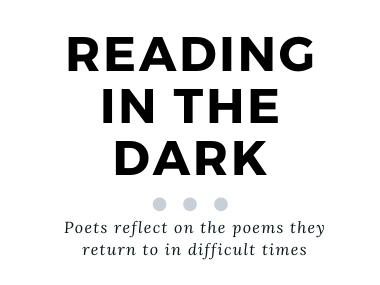Reading in the Dark
Adam Zagajewski on Lars Gustafsson’s “Elegy for a Dead Labrador”

Elegy for a Dead Labrador
Here there may be, in the midst of summer,
a few days when suddenly it’s fall.
Thrushes sing on a sharper note.
The rocks stand determined out in the water.
They know something. They’ve always known it.
We know it too, and we don’t like it.
On the way home, in the boat, on just such evenings
you would stand stock-still in the bow, collected,
scouting the scents coming across the water.
You read the evening, the faint streak of smoke
from a garden, a pancake frying
half a mile away, a badger
standing somewhere in the same twilight
sniffing the same way. Our friendship
was of course a compromise; we lived
together in two different worlds: mine,
mostly letters, a text passing through life,
yours, mostly smells. You had knowledge
I would have given much to have possessed:
the ability to let a feeling—eagerness, hate, or love—
run like a wave throughout your body
from nose to tip of tail, the inability
ever to accept the moon as fact.
At the full moon you always complained loudly against it.
You were a better Gnostic than I am. And consequently
you lived continually in paradise.
You had a habit of catching butterflies on the leap,
and munching them, which some people thought disgusting.
I always liked it. Why
couldn’t I learn from you? And doors.
In front of closed doors you lay down and slept
sure that sooner or later the one would come
who’d open up the door. You were right.
I was wrong. Now I ask myself, now this
long mute friendship is forever finished,
if possibly there was anything I could do
which impressed you. Your firm conviction
that I called up the thunderstorms
doesn’t count. That was a mistake. I think
my certain faith that the ball existed,
even when hidden behind the couch,
somehow gave you an inkling of my world.
In my world most things were hidden
behind something else. I called you “dog,”
I really wonder whether you perceived me
as a larger, noisier “dog”
or as something different, forever unknown,
which is what it is, existing in that attribute
it exists in, a whistle
through the nocturnal park one has got used to
returning to without actually knowing
what it is one is returning to. About you,
and who you were, I knew no more.
One might say, from this more objective
standpoint, we were two organisms. Two
of those places where the universe makes a knot
in itself, short-lived, complex structures
of proteins that have to complicate themselves
more and more in order to survive, until everything
breaks and turns simple once again, the knot
dissolved, the riddle gone. You were a question
asked of another question, nothing more,
and neither had the answer to the other.
—Translated by Yvonne L. Sandstroem
''Elegy for a Dead Labrador'' by Lars Gustafsson, translated by Yvonne L. Sandstroem, from THE STILLNESS OF THE WORLD BEFORE BACH, copyright ©1977 by Lars Gustafsson, copyright ©1983 by Yvonne L. Sandstroem. Reprinted by permission of New Directions Publishing Corp.
In response to the Coronavirus pandemic, we asked poets to write about the poems they return to in difficult times—to find solace, perspective, or even a moment of delight. Subscribe to the PSA newsletter for more Reading In The Dark responses and to keep updated with the PSA.
These days, strange and horrible days (but also, thanks to the stay home order, offering us long moments of concentration, of music, of stillness) I’m torn between two impulses. One of them is, I’m sorry to say, an anti-poetic tendency. I’ve always thought that every poet carries in himself (herself) an anti-poet, someone who’s seeing through all the tricks of poetry, someone who can’t understand why poetry is such a rare guest in our life, why so much of the business of life lies outside of poetry. Why words and events never correspond.
The author who I keep turning to in these moments is Emil Cioran, the Romanian-French thinker who loved and hated poetry, a great stylist who loved ecstatic moments but was unwilling or unable to express them.
The second impulse is more obvious. One of my favorite poets is Lars Gustafsson, the late Swedish poet. Intelligence and blissful metaphors meet in his work frequently. Since at this sad time I think a lot about animals, those who live in our homes and those who’re deeply suspicious of our homes, I choose Gustafsson’s well known poem, "Elegy for a Dead Labrador."
—Adam Zagajewski
Adam Zagajewski is a poet and essayist, is the author of (among others) Mysticism for Beginners, Without End: New and Selected Poems, and Unseen Hand: Poems, translated by Clare Cavanagh. In 2016, he received a Lifetime Recognition Award from the Griffin Trust for Excellence in Poetry.

